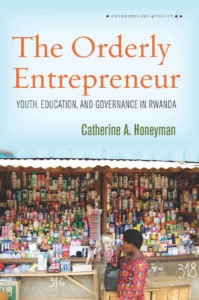Rwanda is perhaps most well-known for the genocide it experienced in the 1990s. In its post-conflict development, the country has had to balance colonial legacies, state centralizing tendencies, and the zeitgeist of neoliberalism. This has made for a careful balancing — one that has left the government regulating the society and economy while simultaneously reducing its responsibility to citizens.
In education, this balancing act manifests in the government’s three aims: credentials, controls, and creativity. The education system is based on credentials awarded through examinations, a colonial hangover, and controls students as part of the state’s centralization efforts; yet, somehow, the system promotes creativity so students can pursue a learner-centered education tailored to their own needs, preparing them for the 21st century labor market of precarious work.
My guest today, Catherine Honeyman, has a new book that explores Rwanda’s opportunities, challenges, and paradoxes in post-conflict development through the policy of mandatory entrepreneurship education, which is believed to be the country’s beacon for economic growth. Catherine Honeyman is a visiting scholar at the Duke Center for International Development and Managing Director of Ishya Consulting. Her new book, The Orderly Entrepreneur, takes us inside both policy making circles and classrooms to understand part of Rwanda’s social transformation. The Orderly Entrepreneur received an honorable mention from the Globalization and Education SIG’s 2016 Book Award.
Citation: Honeyman, Catherine, A., interview with Will Brehm, FreshEd, 64, podcast audio, March 13, 2017. https://www.freshedpodcast.com/catherinehoneyman/
Transcript, translation, and resources:
Entrepreneurship Education in Rwanda

